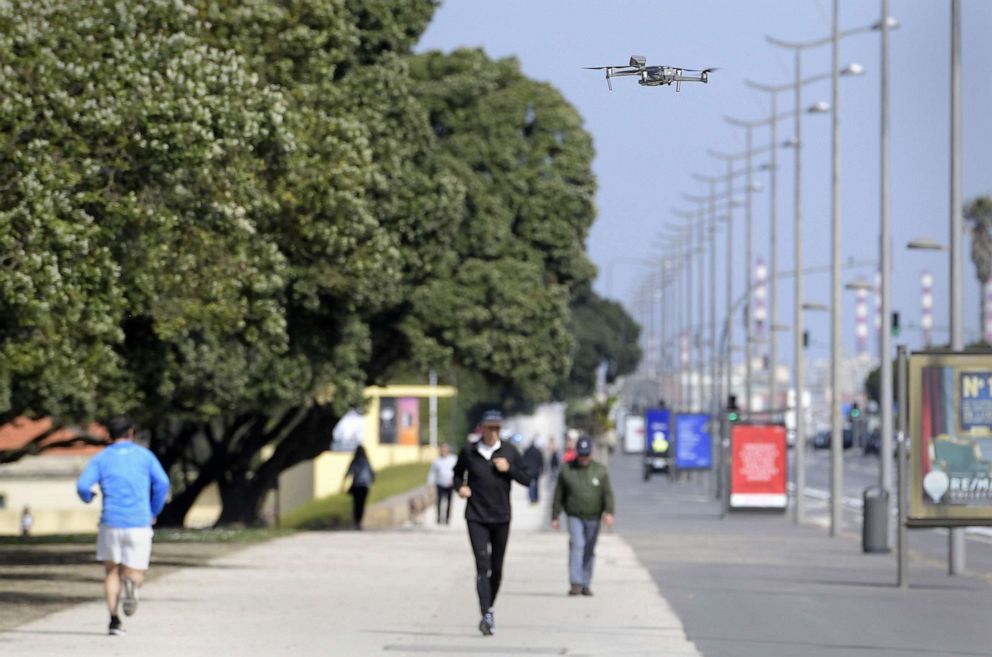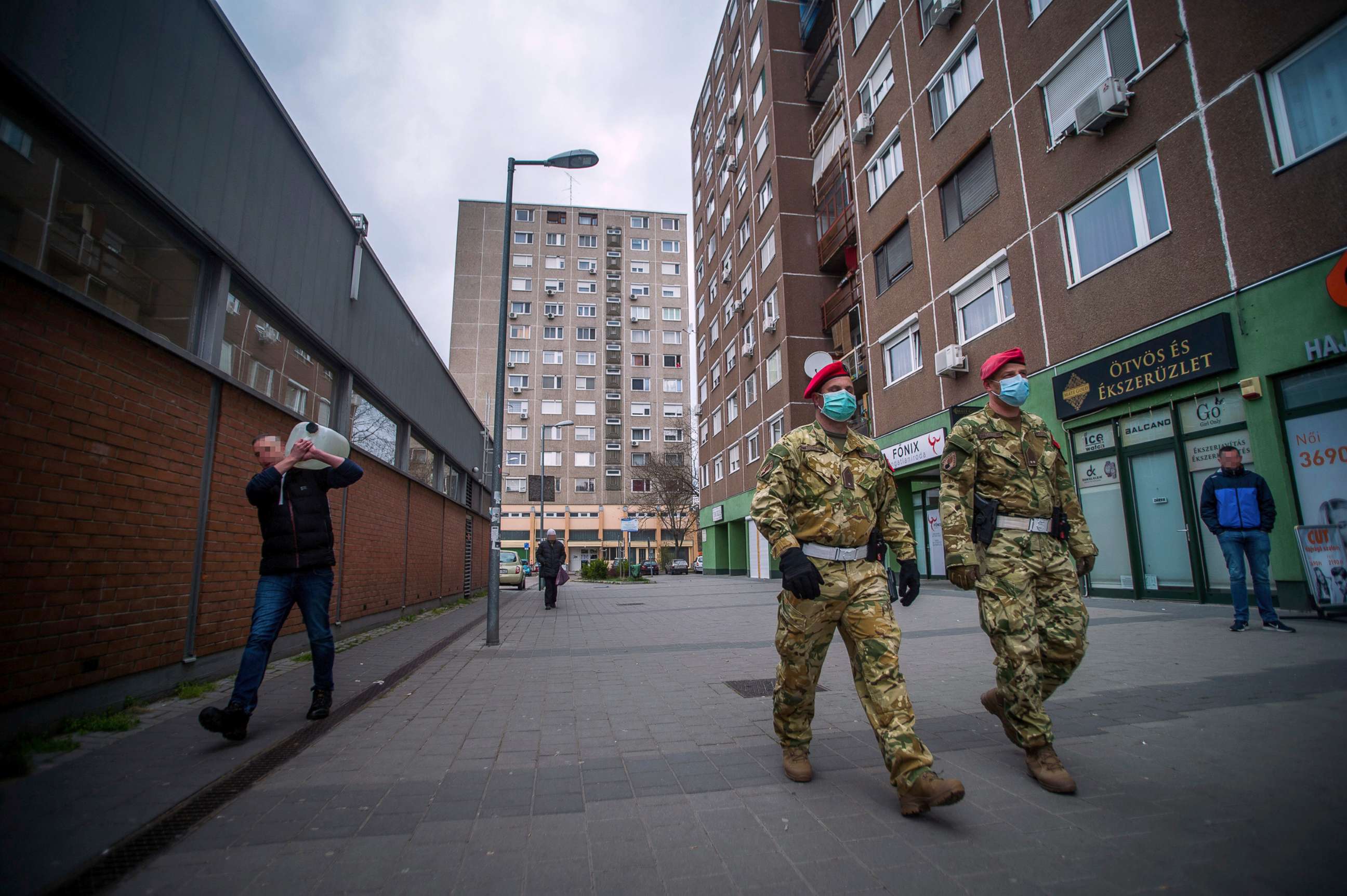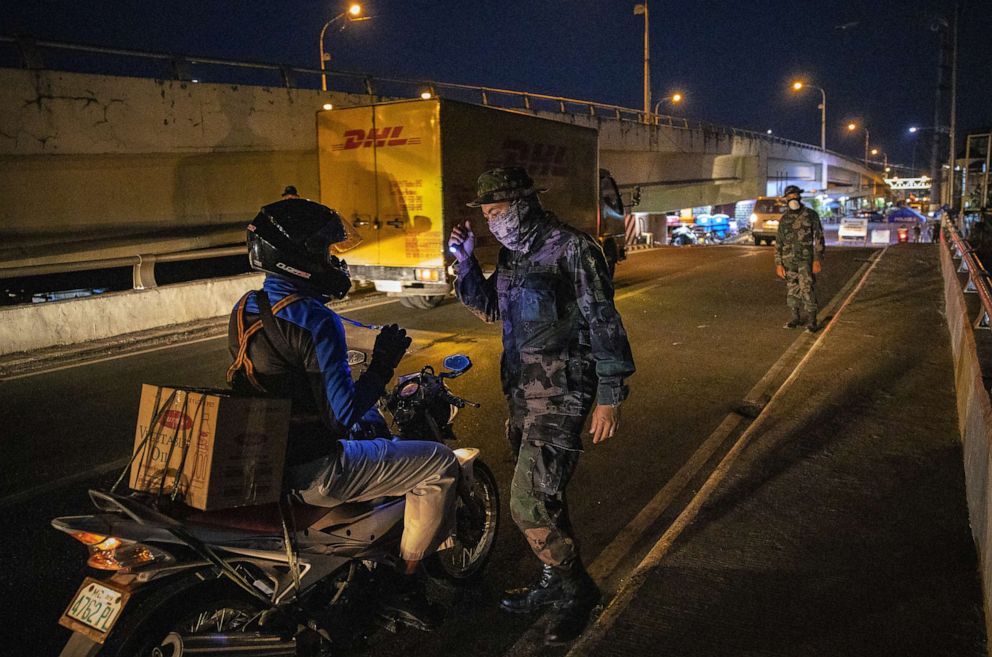In coronavirus pandemic, authoritarians around the world see opportunity to crack down
Leaders with authoritarian instincts may not cede their emergency powers.
LONDON -- Victor Orban, the prime minister of Hungary, was granted extraordinary powers by his nation’s government this week. By 137 votes to 53, lawmakers in the Hungarian parliament voted to give Orban’s government the power to rule by decree to combat the coronavirus pandemic, for as long as the prime minister sees fit.
Rights groups have warned that Orban, who was praised by President Trump last year as having done a “tremendous job” in the eastern European country, appears to be using the guise of the COVID-19 emergency to assume the position of dictator.
In the words of David Vig, Amnesty International’s Hungary director, “This new law bestows unlimited powers to the government to rule by decree beyond the pandemic.”
And the headline in the Washington Post blared: “Coronavirus kills its first democracy.”
Renáta Uitz, chair of the Comparative Constitutional Law Program at the Central European University, called the situation in Hungary "the opening of a new era.”
"This is the first time that he has claimed uncurbed, unconstrained, uncontrolled power,” Uitz said. This is “definitely the closest we have been to what a dictatorship looks like on paper. The elements of power are there. And now the only defense is, ‘OK, I’m not going to use these powers. So we are waiting for a dictatorship in practice.”
The law's “closet competitor is a historical competitor— and that’s the 1933 Enabling Act, that literally put Hitler into the driving seat in Germany. The paper powers resemble those of the 1933 German Enabling Act and that’s pretty scary to whoever has studied history,’ Uitz said.

While the new law in Hungary is the most marked example of national leaders using the coronavirus pandemic to consolidate their power, the unprecedented lockdowns in countries around the world to help stop the spread of the disease, which has no vaccine or known cure, has posed concerns for civil liberties and human rights campaigners.
The lockdown
While the U.S. has so far resisted calls for a nationwide lockdown, the sheer scale of the international response to the spread of the novel coronavirus is unlike anything seen in peacetime.
The Guardian newspaper estimated that around 20% of the world’s population – some 1.7 billion people – were living under some kind of lockdown.
And that was before the 1.3 billion inhabitants of India, the world's largest democracy, were instructed not to leave their homes for 21 days. UNESCO, the United Nation’s education agency, estimates that around 1.5 billion students have had their studies disrupted, by school closures and delayed exams.
After the law giving Orban sweeping new powers was passed, the president of the European Commission, the executive branch of the EU, of which Hungary is a member, issued a statement saying that the Commission would be monitoring emergency measures by member states, which must be “limited to what is necessary and strictly proportionate,” and must “not last indefinitely.”
The “values of freedom, democracy, the rule of law… are common to all of us. We must uphold and defend them, even in these challenging times,” the statement said.
France, Italy and the U.K. have all gone into varying states of lockdown, although the crucial difference is that their governments have set time limits, and promised regular review of the expansion of their powers. Yet the U.K., for instance, has come under criticism for alleged abuse of police powers in monitoring the lockdown.
“Many democratic constitutions have provisions for declarations of emergency for temporary rule by decree, and so the question is what gets rolled back when the crisis passes,” Matthew Kroenig, a senior fellow at the Atlantic Council think tank and author of the upcoming book, ‘The Return of Great Power Rivalry, Democracy vs Autocracy’, told ABC News. “And I suspect in some cases leaders are seeing this as an opportunity to grab power.”
Joe Nye, an American political scientist and former Dean of the Kennedy School of Government at Harvard University, told ABC News that he believes “such policies [of lockdown] will be accepted if they are seen as necessary to save many lives.”
There is an undoubted tension between the emergency powers governments around the world are using to suspend modern life as we know it, and the preservation of vital civil liberties.
“A government is entitled to do that, to protect its citizenry when there is a true threat of health and also of safety,” Michelle Goodwin, the founding director of the Center for Biotechnology and Global Health Policy at the University of California, said. “But that right is not absolute… There have been times across history where the government has quickly turned to health as being its wedge issues in order to carry out what would otherwise be a political agenda.”

‘Never let a good crisis go to waste’
In the current crisis, there remains a difference between conventional democracies taking on emergency powers, and countries in recent years which have "backsliding towards autocracy" – the system of government by one powerful individual – according to Kroenig. Hungary is just one of those countries.
“Part of the broader context here is that we've seen a decline in the number of democracies around the world... we're in a period where autocracy is on the march and democracy appears to be on the decline,” Kroenig said.
Another example is the Philippines, where Rodrigo Duterte, another strongman leader who President Trump has praised in the past, has also been granted sweeping new emergency powers over the country’s healthcare system, which could be extended past three months. He also sought even greater powers to take over private companies and the utility industries, according to NPR.
Like Hungary, the Philippines has also passed laws making the spreading of fake news about the virus a criminal offense, which advocates believe are pretexts for crackdowns.
Pointing to the example of Duterte, Kroenig said some leaders may be seeking powers they “intend to keep forever,” adopting the mantra: “Never let a good crisis go to waste.”
There are many historical examples, he said, of “leaders slowly accru[ing] power until there is no vestige of democracy left.”
Last year may seem long ago in the current climate, yet it is important to remember that protest movements challenged the authority of governments throughout the world – from South America, to India, Iran and Hong Kong.
What to know about Coronavirus:
- How it started and how to protect yourself: Coronavirus explained
- What to do if you have symptoms: Coronavirus symptoms
- Tracking the spread in the US and Worldwide: Coronavirus map
Emergency situations such as the coronavirus pandemic not only allow for governments to use emergency powers, they often see people look to strong leaders in order to deal with them, according to Nye.
“I think such policies will be accepted if they are seen as necessary to save many lives,” Nye added. “Yes, in times of crisis and fear, humans turn to authority figures. Americans tend to rally around the president, and authoritarians tend to seize more power.”

Mass surveillance
The tactics being used to monitor the movement of people, ostensibly to protect public health, could have significant implications for future protest movements, and indeed ordinary life for millions of people, for the coming months and beyond.
A host of democratic countries, Israel and South Korea to name just two, have joined authoritarian regimes such as China and Iran that have sought track coronavirus patients using cellphone data. Several European countries are reportedly considering similar moves.
But in China, the origin of the outbreak, the authorities have gone one step further, resorting to using drones to not just disinfect areas and deliver shopping, but also to track individuals, after they found people could circumvent cellphone tracking by leaving their phones at home, according to Kroenig.
"We've seen specific ways in which authoritarian governments are improving their capabilities to crack down on society in the crisis," he said. "I think the Chinese [Government] are learning lessons in this crisis that they could continue to implement even after the crisis passes."
Indeed, drones have been used to help enforce lockdowns in such a range of places as India, Italy, Portugal and Indonesia.
Russia meanwhile is turning to its facial recognition system in Moscow, already one of the largest in the world, to police its lockdown. The system can alert police when it recognizes people who should not be outside their homes and authorities have said it has already caught 500 people who violated orders to self-isolate since the start of March. The city is also set to introduce a special pass system where residents will receive a QR code that they must be able to show when going outside, even to visit the grocery store.
Miles Kahler, a senior fellow at the Council of Foreign Relations, while hesitant to speculate about how the pandemic will change politics in the long run, is in agreement.
“We have only one other comparable case - the 1918 [Spanish flu] pandemic,” he told ABC News in an email exchange. “In that case, most of the world was already on a war footing; politically, populations had experienced years of large-scale casualties and expected less of their governments in terms of public health.”
In the U.S., the lawmakers on the left and the libertarian right are in general agreement that the use of such measures should be strictly limited, he said, but that those same counterbalances are not in place for a host of countries across the globe.
While it may be too early to say what the long-term impacts on global politics the pandemic will have, what is clear is that we are in a “major historical moment,” according to Kroenig.
"I think this could be a huge inflection point. A point at which things could go in a number of different directions,” he said. “"Where does this stop? Is it temporary to deal with the crisis or do these powers remain in place permanently?"




